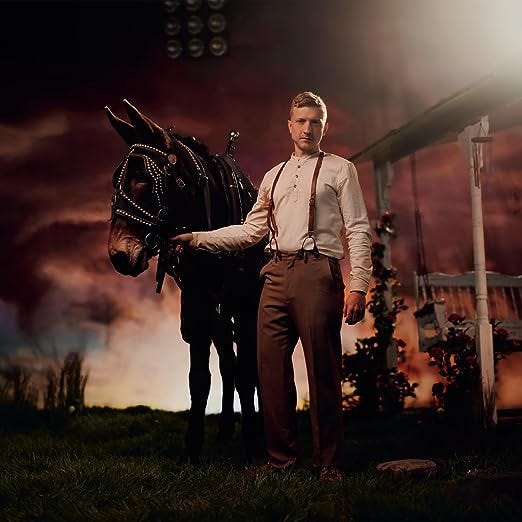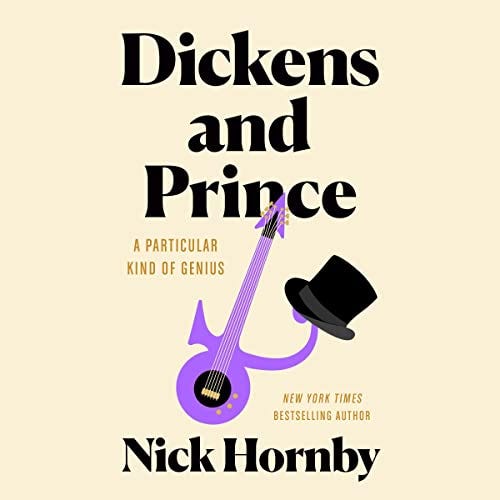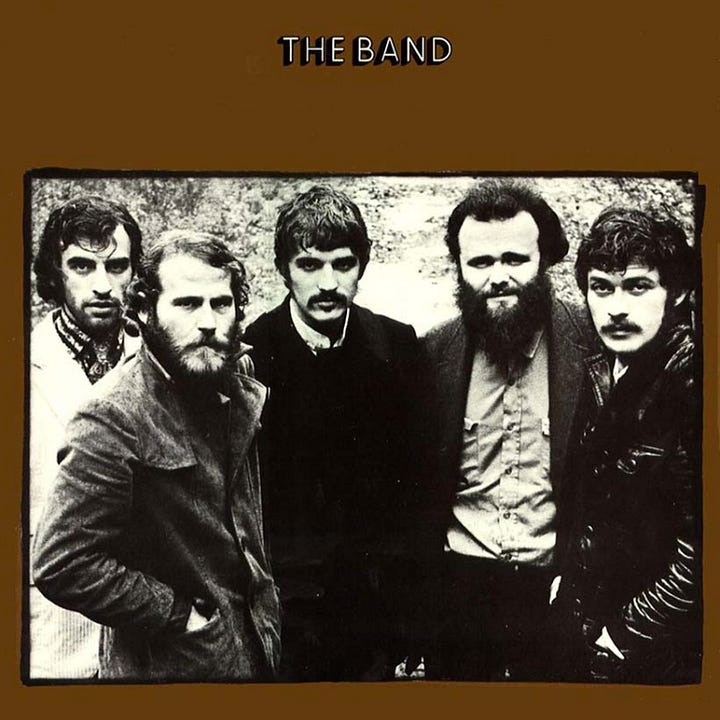Xgau Sez: August, 2023
Episode 1 million of “Why Haven’t You Reviewed . . .," Prince x Dickens, the depressive A list, digging the Band (or not), Sun Ra and a 1969 dispatch from Slug's, and music for rethinking eternity.




Hate to be the millionth episode of “Why Haven’t You Reviewed . . .” but this has to do with artists you seem to champion and then . . . they literally disappear from (your) view. Thinking of a guy in the news now for all the right reasons—Tyler Childers—and what may have been behind three consecutive A- reviews thru 2019 and then . . . crickets — Mike Gamble, Pittsburgh
It’s been years since I made any concerted effort to keep up with pop/showbiz gossip/news—politics keeps me too busy, for one thing. But when my advisor Joe Levy told me Childers had conceived a gay-friendly country video I was pleased but not surprised—from the debut album that featured a Protestant-Catholic romance I’ve assumed he was a very shrewd yet exceptionally decent guy. But I did buy (you know I buy most of my CDs, right?) Childers’s 2022 Can I Take My Hounds to Heaven? without any knowledge whatsoever of 2020’s Long Violent History, an intriguing title I’d never to my knowledge encountered before deciding I should address your query. Problem was, I never got sufficiently het up about Hounds, so after multiple passes decided it was almost certainly some sort of Honorable Mention that I’d best sum up in the August CG—until I determined that Childers had a new album due in September, which the way I’ve long done this work meant I had to hold up my take on Hounds as well. How that will work out I’ll determine at a future date. Not necessarily September, either.
Have you read Nick Hornby’s recent book comparing Prince with Charles Dickens? If so, were you convinced by the comparisons between the two? He brought up parallels I had never considered before, like their impoverished backgrounds and irrepressible productivity. — Don Anderson, London, U.K.
Though I reviewed High Fidelity kindly enough and thought the movie was OK, my respect for Hornby as a critic plunged to near zero in the early ‘00s when during his tour as The New Yorker’s pop reviewer he either was assigned or decided to review Billboard’s top 10 albums and all but bragged that he’d never heard any of them. As someone who greatly admires both Prince and Dickens and perceives not much similarity between them, I’d certainly begin a review copy of the book you describe (which to be frank I’d never heard of). There’s something about the aesthetic equivalences such a book posits just by existing that I like. How far I’d get I have no idea.
Hi there! Big fan, Mr. Xgau. A little while ago (a long while ago, actually) somebody asked for some of your favorite happy or upbeat albums. I’d like to ask the inverse—what are some of your favorite sad, slow albums? I think this might be interesting given your dislike of the sad, slow, or subtle. Do you have any use for depressive or difficult music in your life? Some I’ve found useful would be: Joni Mitchell’s Blue, Sly Stone’s Riot, Mount Eerie’s indelible A Crow Looked at Me, Kendrick Lamar’s Damn., Plastic Ono Band, Phoebe Bridgers’s Punisher, Billie Eilish’s first album. I’d like to add that I’m not a particularly depressive person, and I think sad music is tough to get right without being self-pitying or escapist. And one last pick: Natalie Bergman’s grief-fueled Mercy, a definite recommend that you haven’t reviewed to my knowledge. — Tyler, Cape Town, South Africa
A very strange question I’m only answering in case any other reader is unaware that the albums my big fan Tyler asks about are all but one reviewed in full and positively at the very searchable robertchristgau.com, an excellent place to find out what I think about lots of stuff though keep reading And It Don’t Stop please. Most are full A’s, Lamar an A minus, Sly an A plus. A Crow Looked at Me was my number three of 2017 and Billie Eilish’s debut was number one of 2019. I don’t like the Bridgers much. I intend to prefer the angry to the sad, also the sardonic. I’ll give the Bergman a shot and recommend you do the same for Laurie Anderson’s A plus Heart of a Dog. (P.S. Started the Bergman. Couldn’t get through it. Too wispy and crystalline.)
Robbie Robertson just passed and I’ve always considered him one of rock’s greatest guitarists and an underappreciated songwriter to boot. From what I can tell from your reviews of the Band’s output, their self-titled second album is the only one you unequivocally recommend. Have your opinions of the Band’s albums changed since you reviewed them or do you still consider Music for Big Pink, Moondog Matinee and Northern Lights only B records? They seem more of a concept album band than not but perhaps there’s a best-of in their discography that you love? — Chris Reide, Greenbush New York
It turns out that during our just-friends-except-actually-I-love-you phase I gave Carola an extra copy I had of Stage Fright, and when Robertson died that was the album she asked me give a spin. Hadn’t played the Band in years so I said sure but only thought it sounded good-not-great. For me that’s par. I think it’s more about the singer(s) and maybe the groove than the songwriter(s), but except for The Band they’ve never made an album I really, as we used to say, dig—although four others were B plusses, which is no kind of pan. Also, I’ve always thought Robertson was more a self-important roots-pop middlebrow than the font of wisdom he was widely taken to be, including by himself. If I have time before I file this I’ll try to replay Moondog Matinee–find that’s the one I’m most curious about.
Howdy! I’d be curious to hear your thoughts on the musical value and cultural importance (or lack thereof) of Sun Ra. Your two published reviews, which include a nod to popular favorite Lanquidity and a warm eye roll at the “seminal DIY, bullshit included” of the singles give me a good sense of where you land, as does my understanding of your general critical approach (a disinclination to valorize eccentricity, fecundity, illusory mysticism, and the “integrity” of the marginal for their own sakes, a rather dignified refusal to slog through discographies even diehards consider forbidding and wildly uneven). I also recall you spoke well of John Szwed’s biography, although that doesn’t indicate one way or the other how you feel about Sun Ra’s music. Bemused admiration of the person but little personal use for most of the music? — Isaac Olson, Tacoma
Jazz was my main musical interest during my 1958-1962 college years, where my bebop-to-Coltrane/Coleman preferences were pretty avant-garde although not especially “free” except for Ornette. Between Beatlemania etc. and my critical and romantic partner Ellen Willis, who to put it kindly disliked jazz, I didn’t hear much from 1966 to 1969, although by 1969 Sun Ra in particular was luring me back—see this rather crude report from the way-east East Village Slug’s, which Willis presumably skipped. By 1970 the JCOA events were combining Sun Ra’s style of “free” with more countercultural, hippie-era events on St. Marks Place where I recall Sun Ra’s band participating or even starring. But ultimately I am a rock critic, which means songs with good lyrics, catchy tunes, and a propulsive beat are my meat. Sorting through the inspired and indeed visionary mess of Sun Ra’s catalog would require more time, expertise, and indeed inclination than I have. That said, I clearly should play Lanquidity for Carola sometime. I bet I’d learn something.
As you get on in years do you find yourself rethinking eternity? Do any gospel recordings by Elvis Presley or Johnny Cash find their way on your playlist? — Nathaniel E. Lathy, Columbus, Ohio
Raised born-again Christian and officially “saved” for a spell in my early teens, I’ve called myself an atheist since I was 17, a development I go into some detail about in Going Into the City. Needless to say, however, I could be wrong—maybe there is a God of some sort. It’s also conceivable I’ll be prey to existential terror as death approaches. That said, I find it very hard to believe Christian hymns, especially by Elvis Presley, will provide succor. Maybe Willie Nelson’s Last Man Standing or A Beautiful Time—my mother-in-law listened to Stardust on repeat in her final weeks. Carola has long since nominated Dusty Springfield’s “A Brand New Me” as a way of rethinking eternity.


